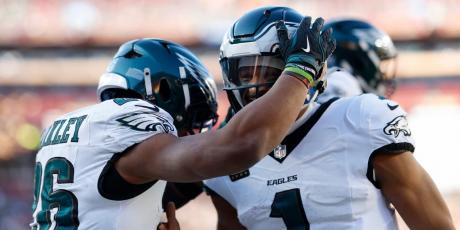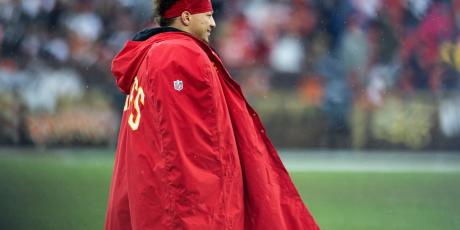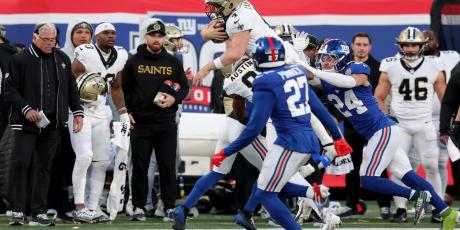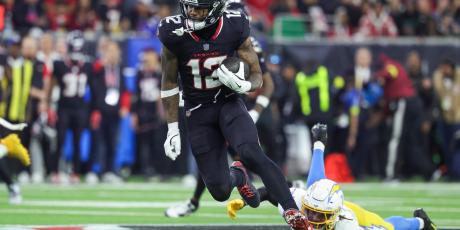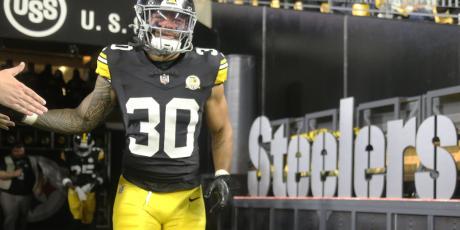The Training Room: Week 9 Injury Updates

We’re halfway through the season, and with positioning in standings becoming that much more important, we are adding a new element to the training room. Moving forward we’re going to cover players recovering from injury and what the potential is for their return to the field. We’ll look at how soon they will be able to return, what to expect from a health standpoint and if they can help your team down the stretch.
On The Mend
Ryan Mathews (Sprained MCL): There’s an outside chance that Mathews could play this week against the Dolphins, but with the Chargers on bye Week 10, they might opt to hold him out to give him extra time. Mathews has been ramping up his activity, with signs pointing to him regaining the starting gig, but Branden Oliver has played well enough to warrant significant playing time moving forward. There’s always risk of re-injury with Mathews, so even though he’s close to returning, his effectiveness remains to be seen.
Rashad Jennings (Sprained MCL): Reports from ESPN NY are stating that Jennings might not be ready for Week 9, with Coach Coughlin backing up that sentiment in an interview. It’s concerning that there is doubt this early in the week, especially considering the Giants play on MNF and are coming off a bye. I would still consider Jennings day-to-day until there’s official word that he’s out this week, but make plans to be without him. NFL players recovering from MCL injuries at times need a week or two to ramp up and feel confident in the knee’s ability, but Jennings should be fine moving forward.
A.J. Green (Sprained Big Toe): Green will attempt to play this week, but will probably be on a limited snap count. He’s been strictly doing individual drills on the side, so he’ll need to show a little more throughout the week to feel confident in using him in your lineup. There is high risk of re-aggravation with Green’s big toe injury, so expectations should be held in check until you actually see him play. No one questions his ability, but the pain in his big toe can and will most likely hinder his explosiveness.
Robert Griffin III (Dislocated Ankle): All signs are pointing for RGIII to be ready at the latest by Week 11. I don’t think the ankle will bother RGIII moving forward, as the Redskins are making sure he’s 100% before putting him back into the starting QB role. The concern I have is that people are looking for RGIII to be the dual threat that we saw when he first entered the league. Unfortunately, I haven’t seen that RGIII since before his 2nd ACL surgery and there’s a good chance he might not regain that form.
Kyle Rudolph (Groin Surgery): Rudolph is participating in team warm-up drills and running on the side during practice. Six weeks from his groin surgery (Sept. 22nd) would put him in line to return in Week 10, but due to the Vikings having a bye that week, it gives Rudolph an extra week to get ready. Rudolph should have no issues when he does return and should be safe to insert into lineups immediately.
Marcedes Lewis (High Ankle Sprain): Lewis has been on short term IR with eligibility to return Week 12 after sustaining a high ankle sprain in Week 2. There shouldn’t be too many issues once he returns and can be used if you need help at TE.
Tyler Eifert (dislocated elbow): Eifert is eligible to come off the IR/designated for return in Week 10. He shouldn’t have any trouble fitting right back into an offense that needs all the players it can get right now.
Charles Sims (fractured ankle): Eligible to come back from IR this upcoming week, there’s some serious steam behind Sims being the main back the rest of the season in Tampa. Sims main issue will be soreness in his surgically repaired ankle after playing at game speed, but he should be able to work through that as he continues to get more reps. It's always tough to project what a rookie will do in his first season, especially coming off an injury, but he's a solid speculative add at this point.
Training Room Injuries
Doug Martin
Ankle Sprain: There are different types of ankle sprains, but the main ones that occur in football are either high ankle sprains, or inversion ankle sprains. A high ankle sprain involves the ligaments between the bones of the lower legs (tibia and fibula), whereas the inversion sprain involves the ligaments on the outer aspect of the ankle. Martin hurt his ankle in the 3rd quarter and did not return. There was no indication which type of ankle sprain Martin sustained.
Bottom Line: Oh how far the mighty have fallen. Martin will be day-to-day for now until we can get a better idea if he sustained a high ankle or inversion sprain. The fact that he was standing on the sideline after he got hurt with ice on the area makes me think we can rule out a fracture, but more testing would be needed to confirm that. Regardless, if Martin were to miss even a game or a few weeks, it’s hard to envision him getting a workload worthy of keeping him on your roster when he returns. Charles Sims is working his way back into the mix and Bobby Rainey has performed well when called upon (outside of fumble issues).
Giovanni Bernard
Hip Strain: Direct trauma to or repetitive use of the muscles/tendons/ligaments around the hip can cause pain. Bernard injured his hip in the 4th quarter against the Ravens and did not return.
Bottom Line: Bernard has now been dealing with a variety of injuries over the past 3-4 weeks, so it may not be a bad idea to scoop up Jeremy Hill just in case another injury costs Bernard some time. Consider him day-to-day for now, but he should be ready for this upcoming week’s game against the lowly Jaguars.
Jordan Cameron
Concussion: Concussions are an insult to the brain from direct trauma. The brain suffers microtrauma and scarring with a variety of symptoms presenting, depending on where the trauma is located.
Bottom Line: Cameron will go through the concussion protocol and hopefully make it through all the necessary tests to be able to suit up against the Bucs in Week 9. Although Cameron does have a history of concussions, each concussion should be treated individually. His history might delay his ability to get through the protocol faster, but check back as the week progresses to see how far along he is.
Brian Quick
Dislocated Shoulder/Rotator Cuff Tear: The shoulder is made up of a ball and socket joint, with the majority of its stability coming from muscles, tendons, and ligaments. A dislocation is when the ball comes out of the socket and stays out, which can cause tears and ruptures to many of the soft tissue structures around the shoulder joint. The rotator cuff is a group of 4 muscles that help stabilize the head of the humerus (ball) in the socket (glenoid). If the rotator cuff is injured, it can prevent an athlete from being able to lift their arm overhead or in other directions without pain. Quick suffered the arm injury in the 2nd quarter and did not return. Coach Fisher confirmed a dislocated shoulder in addition to a rotator cuff tear that will require season ending surgery.
Bottom Line: It’s a tough injury to sustain, as the length of time the shoulder remains out of socket can ultimately cause more soft tissue damage. The dislocation of the shoulder might complicate the injury, depending on if there is any bony compromise, but he'll be ready for OTA’s next season.
Robert Woods
Low Back Pain: Spinal pain can be experienced when going into extreme ranges of motion, particularly when being tackled. There are many structures in the low back that can generate pain, and being forced into a certain position can cause irritation and inflammation which can cause further discomfort. Woods hurt his back in the 2nd quarter and did not return.
Bottom Line: There haven’t been any updates to Wood’s back injury he sustained. Consider him day-to-day for now.
Antone Smith
Strained Neck: See above. Smith left with a neck injury early in the game and did not return.
Bottom Line: There haven’t been any updates on Smith’s neck, most likely due to the Falcons returning from London. We’ll update his status once we know more information.
Nate Washington
AC Joint Sprain: Direct trauma to the acromioclavicular (AC) joint cause disruption of the ligaments around the area that help support it. Normally an AC joint sprain is caused when falling directly on the shoulder. Jackson left the game in the 1st quarter after landing on his shoulder. He did not return.
Bottom Line: Washington will be day-to-day for now, but could miss this week’s game as AC sprains are difficult to recover from and are slow to heal. Washington continues to be that type of receiver who underwhelms each week. There are plenty of better options available on the waiver than Washington. Justin Hunter will continue to establish himself as the deep threat for the Titans.

